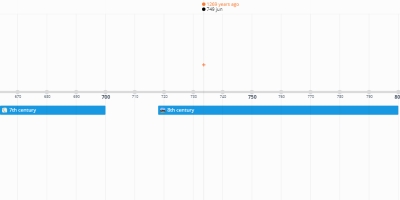17th century (jan 1, 1602 – jan 1, 1700)
Description:
1602 The Portuguese send a major (and last) expeditionary force from Malacca which succeeded in reimposing a degree of Portuguese control.The Dutch East India Company (VOC) is established by merging competing Dutch trading companies.
June British East India Company's first voyage, commanded by Sir James Lancaster, arrives in Aceh and sails on to Bantam where he is allowed to build trading post which becomes the centre of British trade in Indonesia until 1682.
1603 First permanent Dutch trading post is established in Banten, West Java.
1604 A second English East India Company voyage commanded by Sir Henry Middleton reaches Ternate, Tidore, Ambon and Banda. Fierce VOC hostility is encountered in Banda thus beginning Anglo-Dutch competition for access to spices
1605 February The VOC in alliance with Hitu prepare to attack a Portuguese fort in Ambon but the Portuguese surrender.[44]
1606 A Spanish fleet occupies Ternate and Tidore.
1608 Iskandar Muda of Aceh Sultanate launched series of naval conquest on coastal Sumatran and Malay peninsula states. (to 1637)
1610 The VOC establishes the post of Governor General to enable firmer control of their affairs in Asia.
1611 The English establish trading posts at Sukadana (southwest Kalimantan), Makassar, Jayakarta and Jepara in Java, and Aceh, Pariaman and Jambi in (Sumatra) threatening Dutch ambitions for a monopoly on East Indies trade.
The Dutch establish a post at Jayakarta (later 'Batavia' and then 'Jakarta').
1613 The Dutch expel the Portuguese from their Solor fort.
1619 Jan Pieterszoon Coen appointed Governor-General of the VOC who would show he had no scruples about using brute force to establish the VOC on a firm footing.
30 May Coen, backed by a force of nineteen ships, storms the Jayakarta driving out the Banten forces, and from the ashes of Jayakarta, establishes Batavia as the VOC headquarters.
1620 Almost the entire native population of Banda Islands was deported, driven away, starved to death or killed in an attempt to replace them with Dutch colonial slave labour.
Diplomatic agreements in Europe commence a three-year period of cooperation between the Dutch and the English over the spice trade.
1623 In a notorious but disputed incident, known as the 'Amboyna massacre', ten English and ten Japanese traders are arrested, tried and beheaded for conspiracy against the Dutch Government. The English quietly withdraw from most of their Indonesian activities (except trading in Bantam) and focus on other Asian interests.
1628—1629 Sultan Agung of Mataram launched a failed campaign to conquer Dutch Batavia.
1629 Iskandar Muda of Aceh Sultanate launched a failed attempt to take Portuguese Malacca.
1636 The Portuguese are expelled again from their Solor fort by the Dutch following a reoccupation.
1646 Sultan Agung of Mataram dies – and is buried at his graveyard at Imogiri
1667 As a result of the Treaty of Breda between Dutch and England, the Dutch secured a worldwide monopoly on nutmeg by forcing England to give up their claim on Run, the most remote of the Banda Islands. While the Dutch did not press their claims on New Netherland.
1674–1680 Trunajaya rebellion The Trunajaya rebellion. Followers of the Madurese prince Trunajaya rebelled against the Mataram Sultanate. After initial defeats, Mataram requested help from the VOC in exchange for various concessions. VOC-Mataram forces ultimately defeated the rebellion. 1700 With the decline of the spice trade, textiles are now the most important trade item in the Dutch East Indies.
Added to timeline:
Date:
jan 1, 1602
jan 1, 1700
~ 98 years
